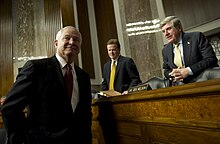Ben Nelson
[7] After graduating from law school, Nelson landed a job as assistant general counsel for Central National Insurance Group of Omaha.
[9][10][11] Nelson first ran for electoral office in the 1990 Nebraska gubernatorial election,[12] defeating first-term Republican incumbent Orr by 4,030 votes out of over 586,000 cast.
[13] He was reelected in 1994 with 73% of the vote, the largest margin of victory for a governor in half a century, despite the national Republican gains that year.
He pushed welfare reform before it was done at a national level and opposed President Bill Clinton's efforts on health care.
[21] With Johanns's move to Washington, few high-profile Republicans stepped up to run against Nelson, as the state party focused its attention on the governor's race.
Nelson defeated Ricketts 64%-36%, the biggest victory margin for a Democratic Senate candidate in Nebraska since Edward Zorinsky won 66% of the vote in 1982.
[31] He lost Nebraska Right to Life's support after voting for the Senate version of health-care legislation, the Patient Protection and Affordable Care Act, which did not contain the Stupak language.
[30] In July 2007, Senator Tom Coburn criticized earmarks that Nelson had inserted into the 2007 defense spending bill, alleging that they would benefit Nelson's son Patrick's employer with millions in federal dollars, and that the situation violated terms of the Federal Funding Accountability and Transparency Act of 2006, which the Senate passed but had not yet been voted on in the House.
Nelson's spokesperson said he did nothing wrong[32] and was acting with "an abundance of caution" when he withdrew the amendment after the new Senate Ethics Rules were passed.
To end a Republican filibuster and pass the measure, the Democrats needed the votes of all 58 of their senators, plus those of two independents who caucused with their party.
[36] His cloture vote came after the measure was amended to permit states to opt out of allowing insurance exchange plans to provide abortion coverage.
[37] The bill also provided full and permanent federal reimbursement for the expenses Nebraska would incur in its mandated expansion of Medicaid eligibility,[35] an amount the Congressional Budget Office estimated at $100 million.
Since Brown had declared himself opposed to the health-care measure, the party's leadership opted to enact the legislation through the budget reconciliation process.
[49] His support for the measure was no longer essential to its passage, since the reconciliation bill was not subject to filibuster and required only a simple majority.
[50] The measure as ultimately passed eliminated the special Medicaid reimbursement for Nebraska, as Nelson had requested in a letter to Senate Majority Leader Harry Reid about a month after his crucial cloture vote.
[44] Nelson said his opposition to the final measure arose from newly added provisions related to student loans[49] that would adversely affect Nebraska-based student-lending firm Nelnet.
"[53] On March 15, 2007, Nelson was one of two Democratic senators to vote against invoking cloture on a resolution aimed at withdrawing most American combat troops from Iraq in 2008.
[56] The Jones Commission supported his view on September 6, 2007, when General James L. Jones presented a report to Congress claiming that "The circumstances of the moment may continue to present the opportunity for considering a shift in the disposition and employment of our forces... such a strategy would include placing increasing responsibilities for the internal security of the nation on the ISF, especially in urban areas.
127 The premise that stability in Iraq would only be achieved through political reconciliation acted on through legislation, a view long held by Nelson, was also recommended by Jones, reporting, "The future of Iraq… hinges on the ability of the Iraqi people and the government to begin the process of achieving national reconciliation and to ending sectarian violence."[57]: p.
130 In the spring of 2007, Senators Nelson, Susan Collins of Maine, and John Warner of Virginia authored a list of measures, or "benchmarks", that were included in the Iraq Supplemental bill.
These benchmarks allowed for progress to be measured in certain areas such as recognition of minority groups, strengthening of internal security forces, and equal distribution of oil revenue.
[62][63] Nelson also voted twice, with three other Democrats, to end Senate debate over Bush's United Nations Ambassador nominee John Bolton.
Therefore, I will not vote to confirm Ms. Kagan's nomination"[66][67] In 1996, Nelson proposed and supported legislation to prevent Nebraska from recognizing same-sex marriages formed in other states.
[76] Proponents argued that the measure would redress an unfair economic advantage enjoyed by online sellers over local businesses arising from the fact that the former were often not required to collect sales taxes from their customers.
A National Journal congressional vote rating from 2006 placed him to the right of five Senate Republicans (Gordon Smith, Olympia Snowe, Arlen Specter, Susan Collins, and Lincoln Chafee).


